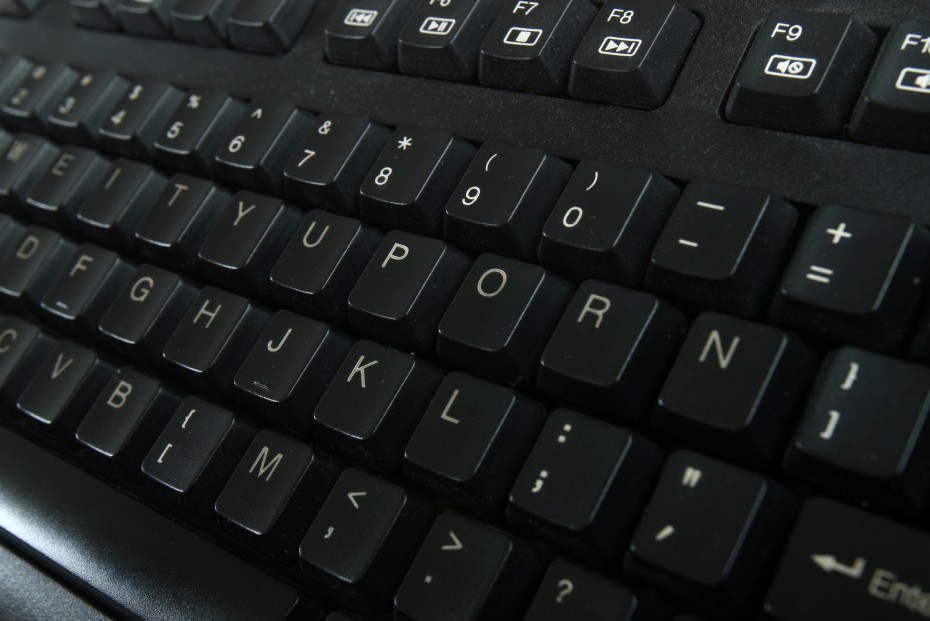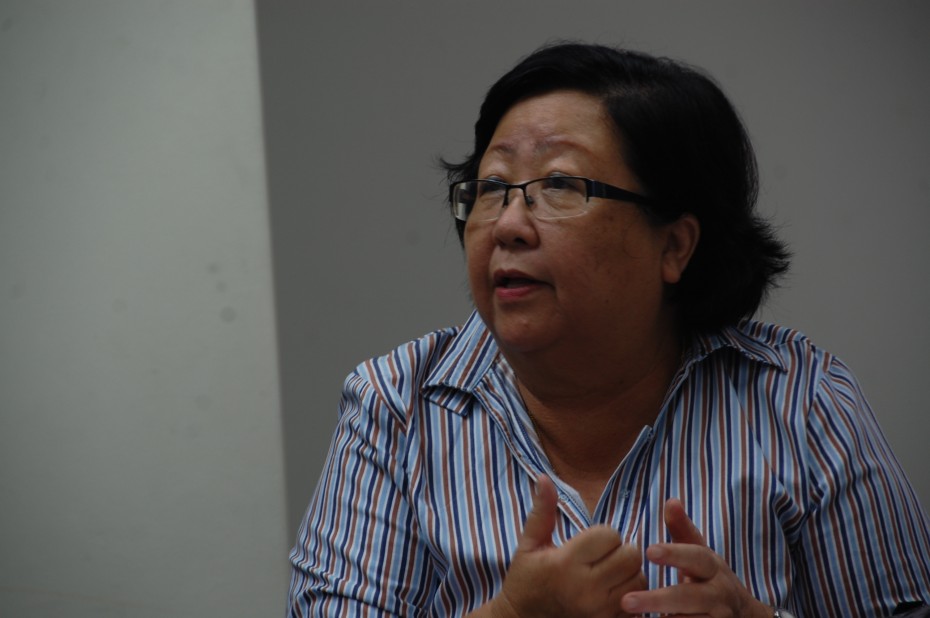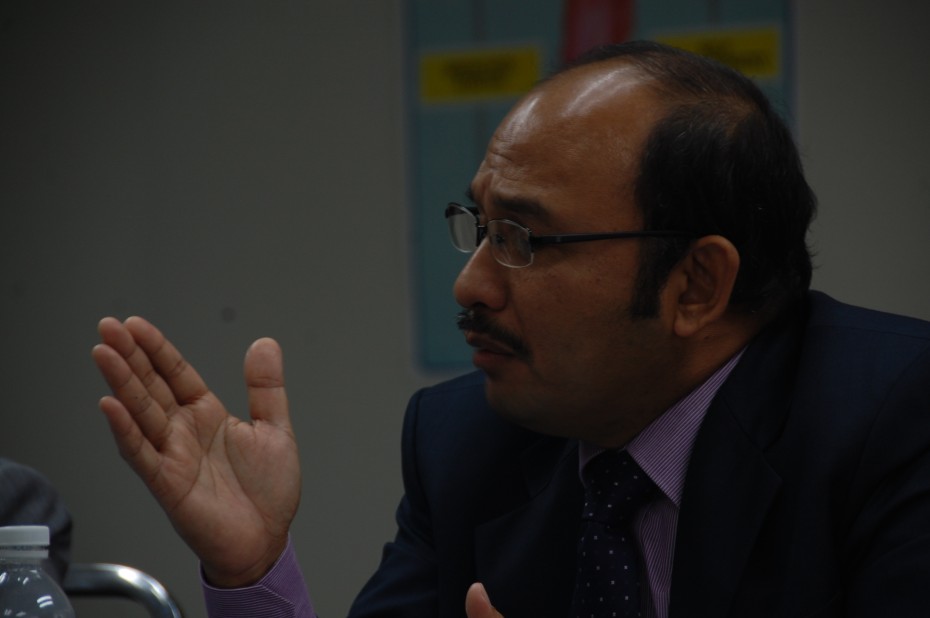By IAN YEE, LIM MAY LEE and ABIRAMI DURAI
alltherage@thestar.com.my
WHEN you’ve got trending news stories like a math genius being caught with 30,000 photos and videos of extreme child pornography, 14-year-old boys filming their teachers in the toilet through a hole in the ceiling and a 15-year-old girl gang-raped by over 30 men, then you know somewhere, something’s not right.

In November 2014, Nur Fitri Azmeer Nordin was found with 30,000 videos and photos of child pornography.
Porn has become so acceptable among a generation that has grown up with the Internet, it may be hard for them to see how a porn habit could contribute to an environment where these things happen.
But porn can mess you up in many ways – you could develop an addiction, warped perceptions about sex, erectile dysfunction, body dysmorphic disorder, an inability to satisfy your partner sexually and much more.
Most of the teens and young adults we interviewed for this story, however, didn’t find anything wrong with porn at all.
Related story: Porn-related crimes, and the 5 stages of porn addiction
This nonchalance towards porn is reflected in online statistics – porn website PornMD recorded 4.04 million searches in Malaysia from August 2012 to January 2013. Averaging 22,000 searches a day, this ranks our relatively small country at 19th in the world.
Pornhub, an online video company specialising in – you guessed it – porn, released statistics in 2014 indicating that Malaysians came in second in South-East Asia for the longest amount of time spent streaming pornography. Malaysia averaged 12.05 minutes per visit, in comparison with Singapore’s 9.50 minutes, and New York City’s 10.05 minutes.
On the other hand, you have young people like Wendy (not her real name), who has experienced first-hand what porn can do to people.
When she was 10, Wendy’s two older brothers, then aged 16 and 18, sat her down and played a pornographic video for her. Then, they started touching her inappropriately.
It never happened again, so she didn’t tell anyone until years later when she told her parents. They made sure her brothers knew the gravity of their misdeed, but decided against sending them for any therapy. That was the last the family ever spoke of it to each other.
Now 19 and in college, Wendy tries to leave the incident behind her. But now that pornography is becoming so normalised, she feels compelled to speak up against it.
“My brothers were overly influenced by what they saw in porn. They watched so much hardcore material that they started thinking it was normal,” she said.
Wendy’s story might seem like an extreme case, but the fact is, porn is everywhere and in many forms these days, and it’s blurring the lines between right and wrong.
Make love, not porn
So, what exactly is the problem with porn? Let us count the ways…
For one, porn contributes hugely to the objectification of women, which in turn creates an environment where women are susceptible to discrimination and abuse.
A study by the University of California in 2000 concluded that very frequent porn viewers have sexual aggression levels four times higher than men who watch less porn. It also said that watching violent porn produced behavioral changes among young male viewers, making them more likely to believe rape myths like “No means yes” and that women like being forced into sex.
“I’ve talked to young men for instance who have seen so much aggressive pornography that their understanding of what rape is, is from my point of view, extremely distorted.
“In other words, you will find young men who will acknowledge that they’ve engaged in acts that meet the legal definition of sexual assault, but they don’t see themselves as having committed a sexual assault,” said Robert Jensen, a journalism professor and author of Getting Off: Pornography And The End Of Masculinity.
“In porn, everything is so exaggerated. A woman is often portrayed as an object to be used. This influences men’s attitudes toward women,” said Professor Dr Low Wah Yun, a chartered psychologist with Universiti Malaya who is currently helping design a curriculum for sex education in schools.
Also, most porn revolves around “hierarchical sex” (though there are exceptions), which focuses on the male’s pleasure. That reinforces an attitude among men that women should be subservient to them.
“In real sex between partners, there is a mutual giving and receiving of pleasure,” said marriage and family therapist Charis Wong, who is currently pursuing certification as a sex therapist with the American Association of Sexuality Educators, Counselors and Therapists.
Too much porn could also create unrealistic expectations and perceptions about sex.
“Watching porn at a young age can lead to young people painting this picture that porn and sex are the same thing, which is just terrible. Sex is a beautiful thing, but porn is a nonsensical industry,” said Assoc Prof Dr Mary Huang, vice-president of the Federation of Reproductive Health Associations, Malaysia.
Those unrealistic expectations don’t just apply to sex, but to self-image as well. All those cyborg-like pornstars on the Internet could give even the most body confident people some doubts – not only about their physical attributes, but their sexual performance as well.
“In online porn, the men are incredibly well-endowed – they are paid precisely because they have those attributes. In addition, some of the men take penile injections so they can perform for half an hour non-stop.
“When you’re a 10 or 15-year-old kid, you say to yourself, ‘I will never, ever look like that or perform like that’,” said world-renowned psychologist Philip Zimbardo in an interview with The Guardian. That could push men to try out one of the many bogus male enhancement treatments or surgeries being promoted all over the Internet – especially on porn sites.
Zimbardo just recently published a book titled Man (Dis)connected: How Technology Has Sabotaged What It Means To Be Male, and he explores how boys are becoming increasingly addicted to porn for various reasons, from the lure of high-tech, interactive 3D porn, to their penchant for “retreating” from the real world to cyberspace.
He continues to add that the kind of porn that’s being produced today is particularly harmful, because old pornography typically had stories to them. The people in them just happened to have sex along the way.
“Now it’s only about physical sexual contact,” he said. “It’s such a bad introduction (to sexuality) because it eliminates romance and love. It’s only visual so you don’t realise what you’re missing – the touching, the kissing, the communication, the negotiation of boundaries. When you see 100,000 instances of it, it becomes the social norm. Every boy believes this is what women want, what girls want.”
And it’s not just porn that is giving people unrealistic expectations about sexuality. Graphic sexual content is everywhere in popular culture these days, from TV series likes Game Of Thrones to celebrity sextapes (whether they are leaked or “leaked”) and Miley Cyrus’ Instagram account.
“When I was young, it was clear what porn was,” said Wong. “Now lots of movies and TV series are full of nudity, and there are songs talk about sex explicitly.”
That’s dangerous, added Wong, because it normalises Hollywood notions about sex and nudity, and clearly, what happens on GoT and in Miley’s sex life is clearly not reality, at least not for most people. So essentially, it could have the same effect as porn – people just don’t realise it because it’s pop culture.
“It’s nothing like porn!” said Julie, 18, with a laugh when asked if she considered movie/TV sex scenes to be porn. “Porn has categories, and you can pick what you want to watch. In TV shows, all you can see are bits and pieces of people touching each other.”
What’s worse, some young people we spoke to actually thought porn could be “educational”.
“It tells us how reproduction happens, so people shouldn’t be judged for watching it,” said Julie.
And it’s no surprise young people are turning to porn, said Dr Low, because Malaysians find it so hard to talk about sex, even in an educational sense. “So instead of talking to their parents, kids go to the Internet for answers, and that’s how they’re learning. It’s okay if these online sources are credible. But if they are not, what exactly are these kids learning?”
Physical problems
The masturbation that comes with watching porn can lead to actual physical problems like porn-induced erectile dysfunction, according to Wong.
Wong explained that porn makes “real sex” boring in comparison, which could cause some men to find it hard to maintain an erection without porn.
A 2011 survey of 28,000 porn users by the Italian Society of Andrology and Sexual Medicine (SIAMS) found that young men who consumed excessive amounts of porn from their teens progressively became immune to even the most explicit images, and developed erectile dysfunction.
“It starts with lower reactions to porn sites, then there is a general drop in libido and in the end it becomes impossible to get an erection,” said Carlo Foresta, head of SIAMS.
And then there’s pre-mature and delayed ejaculation. And yes, delayed ejaculation is a problem. It’s when men find it hard to climax through intercourse.
Robert Weiss, a clinical psychotherapist and sexual addiction expert who has appeared on The Oprah Winfrey Show and Larry King Live, says delayed ejaculation is more common than most people realise.
In his article Sexual Dysfunction: The Escalating Price of Abusing Porn, he wrote that that men who spend the majority of their sexual life masturbating and fantasising to porn are, over time, likely to find their real partners less exciting than the endless supply of new material in their heads.
According to Weiss, “What we are now seeing is an emotional disconnect with spouses and partners that is manifesting physically as sexual dysfunction, be it DE or its better known cousin, erectile dysfunction (ED).”

Watching too much porn may lead to people trying to act it out with their partners, not realising that porn is very far removed from the reality of sex. AZMAN GHANI / The Star
Addicted to porn
Some people might brush off these potential problems with porn simply because they think it’s “just a phase”, and most people would eventually grow out of it without having a ruined sex life or becoming an abusive misogynist.
But as Zimbardo points out in his new book, porn addiction could become a very real problem for the next generation of young men, because for the first time in human history, porn is freely available.
Adam, 30, started with old-school porn in secondary school back in his hometown of Alor Star. It was mostly dirty pictures that were being passed around school.
But things escalated very quickly when he reached university – and had his own Internet connection. His friends began downloading and sharing pornographic video clips, and after a couple of years, he found himself addicted to watching them. He would waste hours a day feeling “stoned” after a porn session.
“I didn’t realise I had a problem until I found that regular sex didn’t excite me the way it used to. I was struggling to ‘perform’ as well with normal sex,” he said.
He started craving a more hardcore, “male-dominant” form of sex. Normal girls who wanted  normal sex didn’t do it for him anymore.
normal sex didn’t do it for him anymore.
And that’s when he decided to go cold turkey, which he said was incredibly hard (no pun intended), but he managed to kick the habit for good. He said he’s lucky it didn’t get to the point where he needed professional help.
According to FocusOnTheFamily.com, there are five stages to porn addiction. It usually starts with early exposure – most people who get addicted are those who started watching when they were young.
Then comes the addiction, where porn becomes part of your life, and you can’t live without it. The next stage is escalation, where you start looking for more hardcore material.
The fourth stage is desensitisation – even the worst smut out there doesn’t excite you anymore. And that leads to the final, most dangerous stage, where you start acting out your by now completely messed up sexual fantasies.
Dealing with the porn problem
So now we know the problem with porn, what can we do about it?
Associate Professor Grainne Kirwan, a chartered psychologist with the British Psychological Society, believes the best thing we can do is to have more open dialogue with children about sex.
“Adolescent curiosity regarding sexuality will drive them to seek information, and they will seek this information in the same way that they get answers to most questions – by searching online.
“Keeping an open dialogue with children, and advising them that if they come across erotic content unintentionally that it is not their fault, is essential. They will need to feel that they can talk to someone about it,” she said.
R.AGE had an interview on cyber safety with Ola-Jo Tandre, the head of social responsibility at multinational telecommunications giant Telenor Group, and he agreed that the best way forward is to increase dialogue about sex and responsible Internet practices, something which the company has been doing through campaigns across the world.
“Countries where issues about sex aren’t discussed – like Saudi Arabia and Pakistan, for example – have the highest rate of Internet porn access,” said Tandre. “And if you rank the states in Malaysia, Kelantan is the highest.”
Clearly, the Internet has a huge role to play in all this, but blocking access to it won’t make a difference, said Philip Ling, the head of sustainability at DiGi.
“Even if families tried to restrict Internet access, the kids say they can always find a way to get what they want these days,” said Ling, based on his experience working on DiGi’s CyberSAFE campaign in primary schools across the country.
“In fact, if you keep children away from the Internet, they wouldn’t have developed any ‘digital resilience’ by the time they turn 18 and finally have their freedom to use the Net.”
And while websites can be blocked, peer-to-peer networks (like WhatsApp, WeChat, Line, etc.) are much harder to police – and they are also making self-generated sexual content, like sextapes and nude photos, more widespread.
“It’s difficult because we cannot block or monitor P2P networks, but that’s where we will focus on in terms of education,” said Tandre.
“In Scandinavia, children have high exposure to the Internet – 70% of nine to 10-year-olds own a smartphone – but there’s also a safety net. There is education, online resources, and the teachers talk about it in school.” Parents are also similarly clued in on the discussion, and are open to dialogue with their children.
“Kids should be taught what a penis and vagina is, the same way they learn what noses and eyes are. It should be part of a normal conversation, and parents should be the ones to teach this,” said Associate Professor Dr Mary Huang, vice president of the Federation of Reproductive Health Associations, Malaysia.
The mistaken assumption that sex education will lower moral values is hampering the experts’ efforts to push for proper sex ed in schools.
“Our values are deteriorating as it is, and people are having casual sex too often without knowing much about contracting sexually transmitted infections,” said Low.
“I’ve been advocating sex education since the 1980s. People are born, grow up, and die with their sexuality, so they need to know how it all works.”
“The more you try to keep them in the dark, the more they will go into explicit websites,” said Datuk Dr Kamaruzaman Ali, president of the Federation of Reproductive Health Associations, Malaysia. “Give them the information they need, and they will no longer be as curious.”







Leave a reply